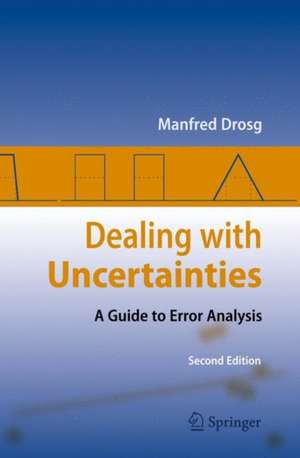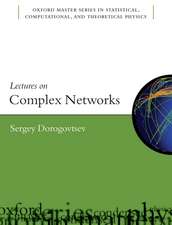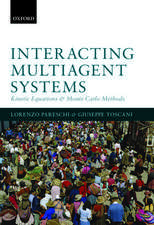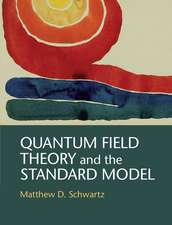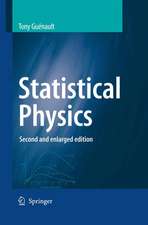Dealing with Uncertainties: A Guide to Error Analysis
Autor Manfred Drosgen Limba Engleză Hardback – 19 aug 2009
| Toate formatele și edițiile | Preț | Express |
|---|---|---|
| Paperback (1) | 638.24 lei 6-8 săpt. | |
| Springer Berlin, Heidelberg – 28 noi 2014 | 638.24 lei 6-8 săpt. | |
| Hardback (1) | 567.63 lei 38-44 zile | |
| Springer Berlin, Heidelberg – 19 aug 2009 | 567.63 lei 38-44 zile |
Preț: 567.63 lei
Preț vechi: 709.54 lei
-20% Nou
Puncte Express: 851
Preț estimativ în valută:
108.63€ • 117.96$ • 91.25£
108.63€ • 117.96$ • 91.25£
Carte tipărită la comandă
Livrare economică 18-24 aprilie
Preluare comenzi: 021 569.72.76
Specificații
ISBN-13: 9783642013836
ISBN-10: 364201383X
Pagini: 252
Ilustrații: XIV, 235 p.
Dimensiuni: 155 x 235 x 20 mm
Greutate: 0.53 kg
Ediția:2nd ed. 2009
Editura: Springer Berlin, Heidelberg
Colecția Springer
Locul publicării:Berlin, Heidelberg, Germany
ISBN-10: 364201383X
Pagini: 252
Ilustrații: XIV, 235 p.
Dimensiuni: 155 x 235 x 20 mm
Greutate: 0.53 kg
Ediția:2nd ed. 2009
Editura: Springer Berlin, Heidelberg
Colecția Springer
Locul publicării:Berlin, Heidelberg, Germany
Public țintă
ResearchCuprins
Basics on Data.- Basics on Uncertainties.- Radioactive Decay,a Model for Random Events.- Frequency and Probability Distributions.- Deductive Approach to Uncertainty.- Correlation.- Dealing with Internal Uncertainties.- Presentation and Estimation of Uncertainties.- Feedback of Uncertainties on Experiment Design.
Recenzii
From the reviews:
"Drosg … emphasizes that uncertainties should not always be viewed as indication of errors but, rather, be embraced by the fact that they will always exist in science and therefore are required to be addressed like any other numbers or data utilized in the study of applied mathematics or science. Drosg has vast experience in nuclear physics and electronics, as is evident from the numerous examples in his book. … Summing Up: Recommended. Faculty; researchers; professionals." (J. T. Zerger, CHOICE, Vol. 44 (11), July, 2007)
From the reviews of the second edition:
“Graduate and undergraduate students and researchers of technical and physical sciences. This book works hard to make a distinction between ‘errors’ and ‘uncertainties’. In most cases, the term uncertainty is indeed more appropriate and informative, but the word error has been used widely in many areas … . The connections with statistics and probability are easy to follow and the book includes many useful exercises and their answers.” (Kimmo Vehkalahti, International Statistical Review, Vol. 78 (1), 2010)
"Drosg … emphasizes that uncertainties should not always be viewed as indication of errors but, rather, be embraced by the fact that they will always exist in science and therefore are required to be addressed like any other numbers or data utilized in the study of applied mathematics or science. Drosg has vast experience in nuclear physics and electronics, as is evident from the numerous examples in his book. … Summing Up: Recommended. Faculty; researchers; professionals." (J. T. Zerger, CHOICE, Vol. 44 (11), July, 2007)
From the reviews of the second edition:
“Graduate and undergraduate students and researchers of technical and physical sciences. This book works hard to make a distinction between ‘errors’ and ‘uncertainties’. In most cases, the term uncertainty is indeed more appropriate and informative, but the word error has been used widely in many areas … . The connections with statistics and probability are easy to follow and the book includes many useful exercises and their answers.” (Kimmo Vehkalahti, International Statistical Review, Vol. 78 (1), 2010)
Textul de pe ultima copertă
Dealing with Uncertainties is an innovative monograph that lays special emphasis on the deductive approach to uncertainties and on the shape of uncertainty distributions. This perspective has the potential for dealing with the uncertainty of a single data point and with sets of data that have different weights. It is shown that the inductive approach that is commonly used to estimate uncertainties is in fact not suitable for these two cases. The approach that is used to understand the nature of uncertainties is novel in that it is completely decoupled from measurements. Uncertainties which are the consequence of modern science provide a measure of confidence both in scientific data and in information in everyday life. Uncorrelated uncertainties and correlated uncertainties are fully covered and the weakness of using statistical weights in regression analysis is discussed. The text is abundantly illustrated with examples and includes more than 150 problems to help the reader master the subject.
Caracteristici
Demonstrates that uncertainties are the consequence of modern science rather than of measurements Coverage includes internal uncertainties, analysis of correlated uncertainties, feedback of uncertainties on experiment design, and weighting in regression analysis other than statistical Gives examples for correlations in data evaluations and for the feedback of uncertainties on experiments This 2nd edition contains additional exercises and solutions Also new: Chapters on the nature of uncertainties without reference measurements, falsification and verification, error analysis, various additional methods for error analysis and other specific topics
